by Naomi L. | August 12, 2013 | Blog, Word of the Week |
Word: taciturn
Pronunciation: TA-si-tərn
Part of Speech: adjective
Definition: reserved or uncommunicative in speech; saying little
Source: Oxford Dictionaries
Mr. Darcy: Do you talk, as a rule, while dancing?
Elizabeth Bennet: No… No, I prefer to be unsociable and taciturn. Makes it all so much more enjoyable, don’t you think?
– Pride & Prejudice (2005)
My mother is a big fan of Pride & Prejudice, as much Jane Austen’s novel as the 2005 movie. To hear her tell it, it’s one of those films that she’ll watch over and over again whenever she sees it showing on TV, because every time she watches it, she takes away something new. And having watched it many times with her already, I have to say that I agree. However, it’s worth mentioning that while my mom is probably learning about the complexities of social protocol in early 19th-century England, I’m learning more about the differences in speech between the language of two centuries ago and that of today, including the differences in common vocabulary. “Taciturn” is one word that jumped out at me a few times while watching this movie, and though I didn’t think much of it at first, I realized after looking it up that it was more relevant to me and my life than I realized…
A “taciturn” person is one who is reserved in their speech, that is, someone who doesn’t talk much. It emerged in the late 18th century (close to the time period of Pride & Prejudice) from the Latin adjective taciturnus, meaning “silent” or “quiet”. This in turn came from tacitus, the past participle of the verb tacere (“be silent”) and the root of the adjective “tacit”, which means “understood or implied without being stated”.
So why do I consider the word “taciturn” relevant to me? Because it’s an adjective I could use to describe myself. Maybe not in every social situation (especially when I’m only in the presence of people close to me), but certainly in public. When it comes to the outside world, most of my communication is in the form of writing instead of speaking. Because of this, I would probably use the word “taciturn” to describe a character similar to me: withdrawn and mostly quiet, more of a listener than a talker. Much like the witty Elizabeth Bennet, who prefers to remain silent and observant during a dance, a person who comes off as “taciturn” on the surface could prove to be a wonderfully complex and engaging character in any story, particularly those as intricate as Jane Austen’s novels.
What are your thoughts on this word? Any suggestions for future “Word of the Week” featured words?
by Naomi L. | August 9, 2013 | J.C. Wolfe's Writing, Poetry |
I don’t know what I’d do
Without their support.
I don’t know where I’d go
Without their guidance.
I don’t know how I’d learn
Without their wisdom.
I don’t know who I’d be
Without their love.
If I’m intelligent,
It’s because they’ve given me sense
To run away from ignorance.
If I’m pretty,
It’s because they’ve given me confidence
That I’m beautiful inside.
If I’m good-natured,
It’s because they’ve given me respect
For the virtue of kindness.
If I’m talented,
It’s because they’ve given me encouragement
To follow my dreams.
If I’m idealistic,
It’s because they’ve given me hope
To make the world a better place.
If I’m romantic,
It’s because they’ve given me faith
That “happily ever after” is real.
But if I have all these qualities,
It’s because they’ve given me
The greatest gift of all:
Their unconditional love.
Dedicated to my parents, the greatest role models I could ever hope for. Thank you for everything you’ve ever done for me! I love you both so much!
by Naomi L. | August 7, 2013 | Blog, Creative Writing, Off The Bookshelf |
OK, it’s time to share another inspiring selection from my bookshelf. Because last week’s Notable Authors post was dedicated to J.K. Rowling, today’s Off The Bookshelf topic is a complementary review of her most famous works. Since I couldn’t say that only one of these books has inspired me, instead I’d like to briefly cover some general points of all seven of the author’s world-famous fantasy novels: the Harry Potter series.
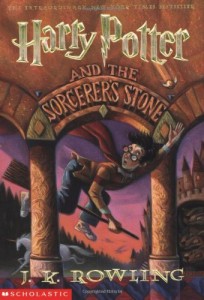
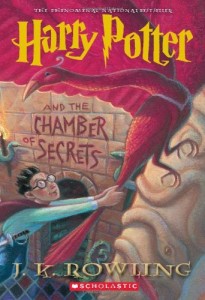
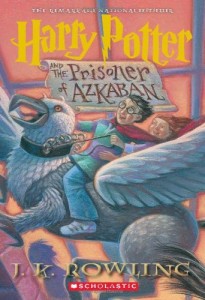
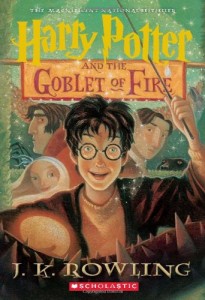
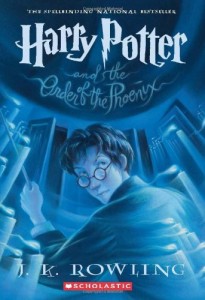
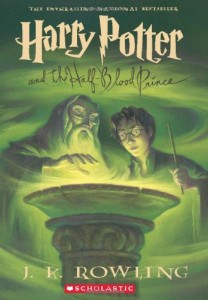
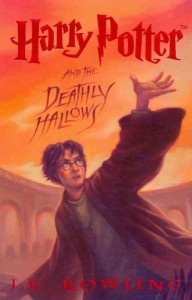
Summary
First published in the United Kingdom by Bloomsbury (June 1997) and in the United States by Scholastic (September 1998), the Harry Potter series consists of seven novels primarily in the fantasy genre, written for a target audience of young readers from children to young adults. The books tell the coming-of-age story of Harry Potter, a wizard boy who gained fame in the underground wizarding world as a baby after mysteriously surviving an encounter with the Dark sorcerer who terrorized the magical community and killed his parents. The series focuses mainly on Harry’s adventures with his friends Ron Weasley and Hermione Granger at Hogwarts School of Witchcraft and Wizardry between the ages of 11 and 17, with each book taking place over one year of the characters’ lives, all strung together through a story arc about the young protagonist’s quest to unravel the mysteries of his life and ultimately destroy the power-hungry Lord Voldemort to save the magical and nonmagical worlds from his evil reign once and for all.
Review
The Harry Potter books have gained incredible success since the first publication of Harry Potter and the Sorcerer’s Stone (if you’ll forgive my use of the American title, since it’s the one with which I’m most familiar), and with such high popularity and critical acclaim, it’s easy to see why. Rowling’s intricate world, compelling characters and engaging storyline quickly drew in millions of readers worldwide, and boosted the novels to become the best-selling book series in history by mid-2011.
Although it’s mostly considered fantasy for its predominant theme of magic, Harry Potter also falls under such genres as mystery, thriller and coming of age. This makes it a very versatile and unique read, which may partly explain its enormous success. Despite appearing as a children’s story about wizards on the surface, the series has many levels to it that make it appealing to a broader range of readers. For instance, those who don’t care so much for fantasy might still enjoy Harry Potter as an adventure story at its core, or for its mystery elements, or even as a tale about a young boy trying to find out who he really is. Aside from its overlapping genres, the author also made a point of allowing various themes to blossom throughout her work, including the trials of adolescence, political subtexts, and especially death.
One of the most notable achievements of this series was the fact that it encouraged so many children to read. Yet there was more to it than just getting kids to pick up books they would normally consider above their reading level. As one of the children of the Potter generation, I can attest to the special experience of growing up with the main characters. I read the first book when I was very close to 11 years old and finished the last one not long after turning 17, and because of the way the series gradually progressed into darker themes with each new book, Harry Potter was the key work of literature in my transition from lighter children’s stories to more mature fiction, helping me to develop both as a reader and as a writer.
There’s no question that these books will forever be revered throughout the history of literature, not only for their record-breaking commercial success, but for their tremendous cultural impact. The series has inspired an entire generation of young readers, and it will always hold a special place in the hearts of the millions who have been touched by the magic of Harry Potter.
Inspiration
If Roald Dahl first hooked me on fantasy stories with Charlie and the Chocolate Factory, J.K. Rowling kept me forever loyal to the genre with Harry Potter. As I like to put it, “I came for the chocolate factory, and stayed for the wizarding school.”
Harry Potter has been a huge inspiration to me since my childhood, as much in fantasy specifically as in the rest of my writing in general. The books have opened my eyes to a wonderful world of fiction, and they’ve taught me a great deal about the techniques and passion it takes to create a magical universe. I’ve been an aspiring fantasy author since I fell in love with creative writing as a child, and I can honestly say that this series has played a major part in keeping my dream alive for so many years. No matter how many other novels I go on to read and even write throughout my life, the Harry Potter books are and always will be among my absolute favorites.
by Naomi L. | August 5, 2013 | Blog, Word of the Week |
Word: obstinate
Pronunciation: AHB-stə-nət
Part of Speech: adjective
Definition:
- stubbornly refusing to change one’s opinion or chosen course of action
- (of an unwelcome situation) very difficult to change or overcome
Source: Oxford Dictionaries
“Obstinate” is another word I learned thanks to vocabulary flashcards in standardized test prep materials. Until then, I was only familiar with much simpler terms for “stubborn”, such as “hardheaded” and “strong-willed”. To be honest, I was surprised I had no memory of ever seeing this word before, since it seems intermediate enough to fit into the type of writing I usually like to read, but then again, “stubborn” usually works well enough to get the point across.
A person who is “obstinate” is someone who won’t change their stand on an opinion or action even after attempts have been made to persuade them otherwise. Similarly, an “obstinate” situation is one that is hard to overcome or change for the better. The word can be retraced to the Latin adjective obstinatus (“firm, resolved, resolute”), in turn stemming from the Latin verb obstinare (“persist, be determined on”), or so my research has led me to understand.
It’s worth noting that while “stubborn” is a more general term for any person who is naturally resistant to altering their ways, “obstinate” is more appropriate for describing specific cases in which one refuses to back down on a decision, especially when others try to convince them to change it. Also, while there are other synonyms for “stubborn” that may be neutral, this word usually seems to carry a more negative connotation, as in unpleasant behavior or problems that can’t easily be fixed. In light of this information, when describing someone, I would probably suggest using “obstinate” to define unyielding behavior on a particular course of action that might otherwise be atypical for the character in question. In most other cases, “stubborn” and its simpler substitutes would likely work just fine.
What are your thoughts on this word? Any suggestions for future “Word of the Week” featured words?
by Naomi L. | August 2, 2013 | Flash Fiction, J.C. Wolfe's Writing |
Light. Move. Light grows. Crawl out. Buzz. Bright light. Crawl from egg. Free.
Wings. Grow. Flap. Buzz. Flap, flap. Whir. Fly.
Light is bright. Fly around, see many others. Buzz around. Food is close. Smell the food, land. Feed. Flap again, buzz again. Fly away.
Light is bright. Fly around, see many others. Buzz around. Food is close. Smell the food, land. Feed. Flap again, buzz again. Fly away.
Female…
Light is bright. Fly around, see many others. Buzz around. Food is close. Smell the food, land. Feed. Flap again, buzz again. Fly away.
Movement. Ground shifts. What? What is that? Large eyes. Something sees us.
New food. Ground moves. Smell other food. Dark, then light. Fly, find the food. Feed. Flap, buzz. Fly away.
Brighter light now. What is this? Ground moves again. Ground is… in the air?
New ground moves away. Change in the air…
Aaahhh!!! It burns!
Fall…
Cold ground. Bright light. Twitch. Darkness closes in… In the air, hear a sound…
“Drosophila.”
The idea for this piece came to me some years ago, when I was taking a Classic Genetics class for my Biology course. The story depicts the course of a genetic drift experiment as told from the perspective of one of the test subjects: a fruit fly of the genus Drosophila. Fruit flies are very commonly used in simple genetics experiments, and for some reason I thought it might be interesting to try writing a story about their life course during an experiment: over two weeks, the flies are hatched in a jar with a floor covered in a special nutrient mix, left to grow and reproduce, moved to another jar so as not to crossbreed with the new generation of flies, and eventually knocked out with alcohol fumes and placed under a magnifying glass for observation. The simplicity of the writing is meant to mirror the simplicity of the fly and its life, and the repeated paragraphs reflect what I assume would be the fly’s extremely short memory span and limited activity inside the jar.
Hope you’ve enjoyed the piece! Thanks for reading!










Recent Comments